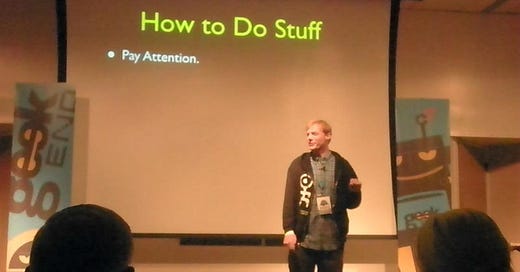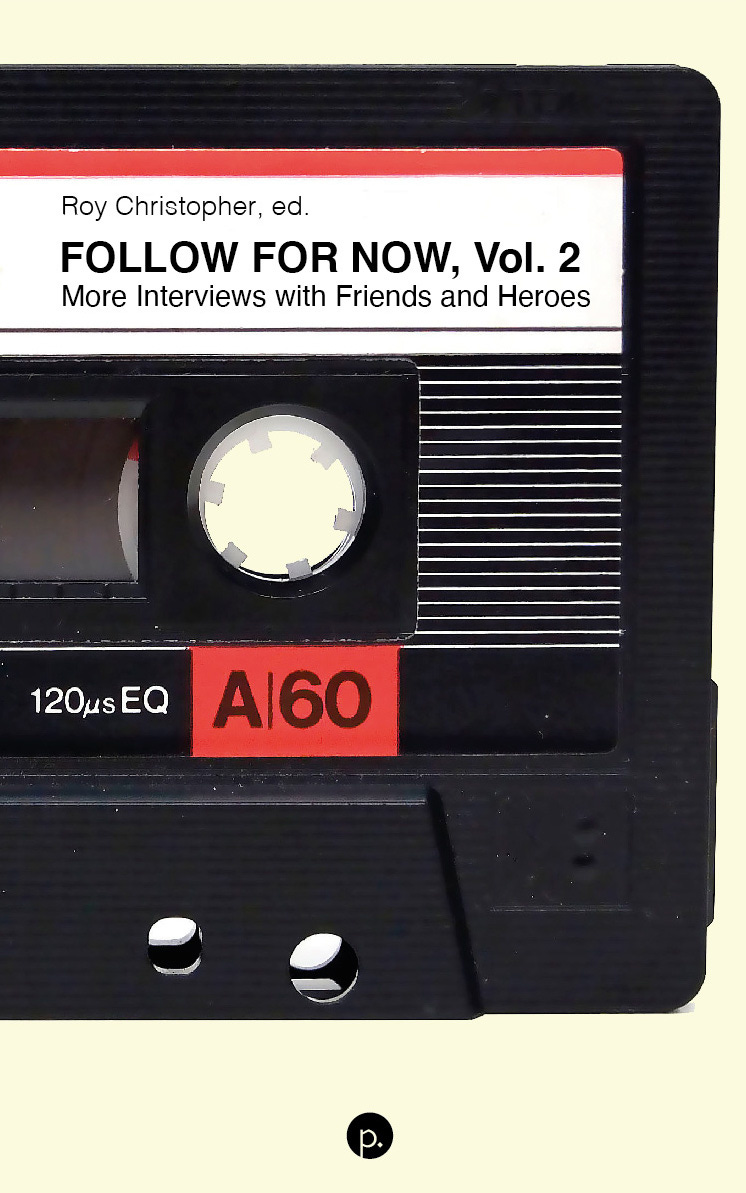In the late aughts, I did a talk at several events and on several college campuses called “How to Do Stuff and Be Happy.” The title was a joke, but the advice was real. It was a bunch of things I’d learned in the pursuit of various interests, mostly writing and publishing. Someone asked me recently why I bother to do I do any of the things I do. What follows emerged from an attempt to answer that question.
I started making zines in my teens. My friend Matt Bailie and I saw the first zine-review article in Freestylin’ Magazine and decided we should make one ourselves. It was the spring of 1986. We were just about to start high school.
Ten years later I registered the domain name of the last long-running zine I’d been making, and frontwheeldrive.com became my first website. After a false start or two, I ran the site steadily from 1999 to 2008. Two other like-minded dudes, Tom Georgoulias and Brandon Pierce, and I did interviews and wrote reviews about media and science and culture and whatever. Somewhere in there, I self-published the best of those interviews as a book called Follow for Now: Interviews with Friends and Heroes (Well-Red Bear, 2007).
One wrongheaded move I made during my transition from skateboarding and music zines to heavy, heady websites was thinking that I needed to completely replace old interests with new ones. I had just become a reader of books and was wishing I’d been one all along, so it was out with the hip-hop and punk rock and skateboarding and in with the science and literature and media theory. Eventually I realized that if not for the one there wouldn’t be the other. Music taught me how to do research. Who was on what record label, who used to be in what band with whom, who produced what, who was down with whom—these were the footnotes. I was already digging for sources, for citations. Skateboarding introduced me to art and determination and all of the music I love. Everything is research, and there’s room for all of it.
For the decade after closing frontwheeldrive.com, I reluctantly moved everything over to a blog format under my own name, roychristopher.com. One of the things I had finally realized about strictly publishing interviews with other people is that the other people are the focus. That’s exactly how that should be, but if you’re trying to build your name as a writer, as I was, the interview format doesn’t showcase your writing. Blogging, for what it’s worth, does that. It’s you and your words, and that’s it.
I learned another minor lesson from simply the naming of a thing: As flimsy a front as it might be, if you run a publication, people will quote it—assuming you’re giving them words worth quoting. They will proudly print, “she told Roy Christopher of frontwheeldrive.com…” If you’re nobody like me, they won’t quote you if the website bears your name. They won’t proudly print, “she told Roy Christopher of roychristopher.com…”: a small lesson, but a lesson nonetheless.
Through two decades of doing these two websites, as well as all the zine and magazine work that preceded them, I suppose I have managed to establish myself enough to be able to pitch ideas, write books, and do freelance writing here and there. One thing that differentiates my writing from some of my colleagues and peers is that I don’t rely on it for my living. The truth is that, aside from a few years in the 1990s, I’ve just never been able to pay my bills as a writer. Hell, since then being a writer has cost me money! That’s not a complaint, nor is it important.
What’s important is that whether or not you rely on something to pay your bills changes the goals and the results of that something. For instance, I was interviewing a band last week. There is nothing unique about my interviewing a band. I’ve been doing it for a while. The difference is that if I’m interviewing a band, it’s because I like them. I’m interested beyond the story I’m writing. That makes the way I do interviews different from when I was doing them on assignment for money. It changes them so much that the bands I interview usually notice the difference.
I hope the same can be said for my writing in general. Dan Hancox at The Guardian (see?) described my recent book, Dead Precedents, as “written with the passion of a zine-publishing fan and the acuity of an academic.” That’s the kind of compliment you hope for, and it comes from pursuing a certain kind of goal. One of the things I have found when teaching writing to others is that students have the most difficulty coming up with something to write about. More than any other part of the writing process, topic selection stumps them—more than the challenge of the initial blank page, or coming up with titles, thesis statements, headlines, leads, or anything else. I tell them to find something they already like, that they want to know more about, and that they want to tell people about.
That impulse, that desire to tell others about something cool, is the core reason I do just about everything I do. It’s the reason I’m a writer. It’s the reason I’m a teacher. It’s the reason I made zines. It’s the reason I made websites. It’s the reason I’m writing this right now. No one can tell you “How to Do Stuff and Be Happy,” but when you find that thing, that impulse, that thing you’ll do anyway, you’ll be on your way.
Follow for Now, Vol. 2: More Interviews with Friends and Heroes
The above essay serves as the preface to a my new interview anthology, Follow for Now, Vol. 2. This collection picks up and pushes beyond the first volume with a more diverse set of interviewees and interviews. The intent of the first collection was to bring together voices from across disciplines, to cross-pollinate ideas. At the time, social media wasn’t crisscrossing all of the lines and categories held a bit more sway. Volume 2 aims not only to pick up where Follow for Now left off but also to tighten its approach with deeper subjects and more timely interviews. This one is a bit more focused and goes a bit deeper than the last. It includes several firsts, a few lasts, and is fully illustrated with portraits of every interviewee.
“Relentlessly stimulating and insight-packed, Follow for Now is the kind of book I’d like to see published every decade, and devoured every subsequent decade, from now until the end of humanity.” — Maria Popova, Brain Pickings
Here’s the full Table of Contents:
MEDIA:
Carla Nappi: Historical Friction
Kristen Gallerneaux: Unattended Consequences
Dominic Pettman: Human Matters
Rita Raley: Tactical Humanities
Jodi Dean: Of Crowds and Collectives (by Alfie Bown)
Gareth Branwyn: Borg Like Me
Ian Bogost: Worthwhile Dilemmas
Mark Dery: Nothing’s Shocking
Brian Eno: Strange Overtones (by Steven Johnson)
Zizi Papacharissi: A Networked Self
Douglas Rushkoff: The User’s Dilemma
danah boyd: Privacy = Context + Control
Dave Allen: Every Force Evolves a Form
HIP-HOP:
Juice Aleem: Don’t Be Afraid of the Dark
Labtekwon: Margin Walker
M. Sayyid: The Other Side
Shabazz Palaces: A New Refutation
dälek: Build and Destroy
Matthew Shipp: Heavy Meta
Tyler, The Creator: The Odd Future is Now (by Timothy Baker)
Tricia Rose: Warrior Soul
Sean Price: Bless the M.I.C.
Rammellzee: The Wrath of the Math (by Chuck Galli)
Cadence Weapon: Check the Technique
El-P: Wake Up. Time to Die.
Sadat X: My Protocol is Know-It-All
WRITING:
Ytasha L. Womack: Dance to the Future
Bob Stephenson: Bit by Bit
Pat Cadigan: Eyes on the Skies
Mish Barber-Way: Flour Power
Chris Kraus: Wildly Contradictory
Simon Critchley: The Skull Beneath the Skin (by Alfie Bown)
Clay Tarver: Gone Glimmering
Nick Harkaway: A Dynastic Succession of Trouble
Simon Reynolds: Erase and Start It Again (with Alex Burns)
Malcolm Gladwell: Epidemic Proportions
William Gibson: The Co-Evolution of Humans and Machines (by Kodwo Eshun)

Thirty-seven interviews deep, Follow for Now, Vol. 2 is a hefty collection of ideas and inspiration from some of the most important writers, artists, and thinkers of our time. It includes the first interview with Tyler, The Creator and one of the last with Rammellzee. A lengthy discussion between William Gibson and Kodwo Eshun caps it all off.
It’s now available from punctum books! Get yourself a pretty paperback or an open-access .pdf!
Thank you all for reading,
-royc.
http://roychristopher.com







